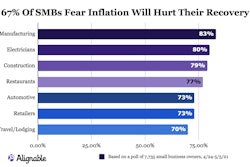
At the beginning of the Coronavirus disease (COVID-19) pandemic, supply chains faced an unprecedented disruption. To adjust to the rapidly evolving conditions and stay on track for deliveries, many links in the supply chain turned to automation for business continuity, as well as for managing contracts and fulfillment. Now, during the largest vaccination rollout in history, the freight industry is tasked with delivering roughly 4.22 million Pfizer and Moderna COVID-19 vaccines each day in refrigerated vehicles throughout the United States.
These massive shipments require specially designed, temperature-controlled thermal shippers that use dry ice to maintain the recommended storage temperature conditions of -94°F ± 50°F for up to 10 days unopened. In addition to storage temperature and expiration dates, there is another unseen, critical link in the COVID-19 vaccine supply chain which is often overlooked -- contract management.
To successfully execute the vaccine supply chain, the organizations involved must constantly manage a high volume of contracts since each business-to-business transaction is set contractually. Without real-time data and clearly defined contract terms, supply-chain solution providers are unable successfully manage these vaccine deliveries. Digital contracting tools also allow suppliers to cross-reference live location data with the contract’s conditions to ensure that vaccine deliveries remain on track. Also, digital contracts clarify financial liability if the shipments get behind schedule.
With these unprecedented challenges, legacy contract systems are ineffective because they do not integrate with other applications across the business and so are unable to keep pace with the rapidly changing situation. Modern technology and artificial intelligence (AI)-powered contract lifecycle management (CLM) software allows freight companies to continuously track shipments and manage millions of deliveries. It seamlessly integrates with logistics software, which is necessary to track the thousands of different COVID-19 supplier and freight service contracts.
By leveraging CLM tools, freight companies will be able to effectively deliver vaccines across the entire country within the next year. To illustrate this, here are three critical roles that CLM plays in the COVID-19 vaccine supply chain.
1) Tracing vaccine deliveries and anticipating risks
When organizations are responding to a crisis, whether it be the pandemic or environmental challenges, contracts are always at the center, serving as a roadmap for businesses. AI-powered CLM can support the unique contractual requirements of the pharma industry, including multiple party agreements for research and collaboration to develop new vaccines and treatments. Also, CLM enables enterprises to quickly compare terms with standard clauses to help negotiate smarter agreements with vendors and suppliers. If a contract is set to expire, the CLM system automatically notifies the contract manager of the upcoming date and any related agreements that also need review and renewal.
To protect the life-saving vaccine, pharma companies are trusting freight providers to deliver it intact to hospitals and pharmacies before its expiration date. However, logistical hurdles and shipping delays tend to complicate the process for freight companies to ensure vaccines are delivered on schedule every time, without fail. That is why is it critical for freight providers to anticipate risks before a roadblock arises when planning their COVID-19 vaccine delivery timelines.
Tracking deliveries in real-time and anticipating contractual and logistical risks along way helps protect the freight company from facing financial consequences because they are liable for the product. If cargo is lost, damaged or late, the freight company may be liable and have to pay the supplier the cost of the compromised products. In this case, CLM helps by keeping a record of vendor and supplier performance and can then help organizations forecast risks across the supply chain.
2) Integrating CLM with truck temperature-tracking technology to monitor vaccine expiration
For a distribution system like the COVID-19 vaccine, technology is key in collecting the massive amounts of data that will enable freight companies to meet logistical challenges. Combining the right technology tools with automated CLM, important contracts and documents are stored in the cloud and can be integrated across the supply chain to increase visibility. When paired with real-time data from trucks, distribution centers, and healthcare providers, automated CLM can actively monitor supply chain performance.
CLM enables companies to collect data automatically from contracts that have been uploaded to the system. It allows supply chain solution providers to manage supplier risk, track inventory and cross-reference shipment delays with contractual agreements. Without harnessing modern CLM technology, along with AI, vaccine distribution could take years, which is time we do not have with such a devastating pandemic.
For Pfizer’s and Moderna’s supply chains, freight companies can train an AI model to search for supply chain risks in existing vendor contracts to help anticipate delays or issues with truck refrigeration. These AI models must be customized to each organization, but vaccine producers and supply chain providers simply don’t have the time to build them on their own. So, they look to established enterprise technology for these types of agile, AI-enabled contract management tools.
3) Keeping supplier contracts and other backend business processes secure from hackers
COVID-19 vaccine supply chain security is also a main concern in the United States right now. Vulnerabilities in the supply chain can bring down even the most advanced digital business. The recent SolarWinds cyber breach brought to light this challenge and the need to take immediate action to address supply chain security issues.
Freight providers must be able to rely on technical vendors to deliver secure applications that allow them to provide impactful solutions to customers. But first, software supply chain partners must be fully vetted to ensure they have a comprehensive approach to application security. Contract management ensures that digital documents shared across organizations in the supply chain remain secure in the cloud, even when multiple vendors are making updates to contracts simultaneously. This prevents revenue loss due to long review cycles and also mitigates data security issues if contracts were previously located on desktops or local drives. Compliance risk is also reduced thanks to a full system audit trail, field-level permissions and automatic reminders for expiration dates and escalations to ensure critical tasks don’t slip through the cracks.
The ability to share contracts and legal documents quickly and securely is a key backend process to keep the COVID-19 vaccine moving forward and on schedule. In addition, being able to electronically sign contracts makes the process more efficient, especially with a workforce spread across different time zones.
Preparing for the next global crisis
With automation, manufacturers and logistics companies can finally achieve full supply chain visibility when tracking shipment updates and movement. On top of that, AI-powered CLM can be used to pull out critical insights that give supply chain solution providers the insight needed to react swiftly to future disruptions. CLM also helps to safeguard businesses from liability. This is critical for companies in the vaccine supply chain so they can manage supplier risk and adjust their processes by tracking inventory and shipment delays against contractual agreements.
Throughout COVID-19, technology has been a key element in business continuity, overcoming the challenges of a primarily remote workforce and keeping workers on the front lines safe. So, whenever the next global crisis happens, supply chains are now stronger than before and ready to address disruptions head on.
Getting started
To take the first step in deploying automation like CLM, supply chain executives should consult a third-party software research firm, preferably one based on real customer experiences. These resources provide unbiased information on both capabilities and customer experience, which is invaluable for supply chain leaders looking for a CLM solution that fits the needs of their organization.











